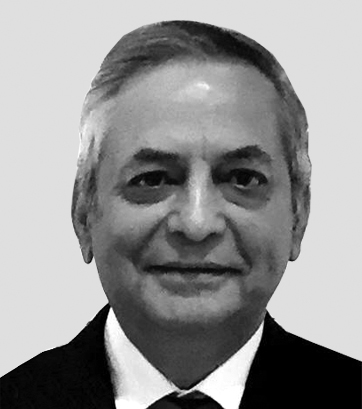Imran and ZAB: déjà vu
The writing is on the wall where the ugly picture of our democracy is hanging upside down. The biggest power in the world has moved to crush the Pakistani leader’s exercise of option. Although there’s many a slip between the cup and the lip, but apparently the die is cast.
One can dwell on the ramifications of this political turbulence in detail, but my thoughts reeled back to the uncanny similarities between Zulfikar Ali Bhutto’s downfall and moments during the mammoth rally of PTI in Islamabad where PM referenced a letter written to him by apparently some external power. Around March 1976, when in desperation or by design, PM Zulfikar Ali Bhutto rode a jeep to go to Rawalpindi’s bustling Haathi Chowk and waved a letter addressed to him by Cyrus Vance, the then U.S Secretary of State, to have “quiet talks”. Bhutto refrained from divulging the details, but in a very long speech in Parliament, he referred to “white elephants” after his blood.
Earlier, Dr Kissinger, the National Security Advisor, had quietly landed in Tehran and after twisting King Raza Shah Pehlevi’s arm for attempting or planning to acquire nuclear reprocessing plant, Bhutto was informed that Kissinger wanted to visit him from Iran. It did not take Bhutto long to understand Kissinger’s real mission.
PM Bhutto chose to receive Kissinger in Lahore instead of Islamabad. During the reception at the Governor House that evening, Bhutto said, “Dr Kissinger, we are extremely sorry for not being able to afford you a befitting welcome because of torrential rains. This is the season of monsoon here and it rains heavily around this time of the year. We have five rivers here and when it rains the rivers get flooded. When these five rivers get flooded, they bring devastation to the habitation around it. This has been happening for centuries, Dr Kissinger, and in controlling and taming these five rivers, we have learnt diplomacy.”
Obviously, he was referring to the five veto-power holding members of the UN Security Council, while talking about the five rivers of Punjab. Soon after the standing ovation when Dr Kissinger spoke, he admitted that it had always been difficult to speak after Mr. Bhutto had spoken since he undoubtedly was one of the finest orators.
Pakistan National Alliance was created, mobilised, funded and launched to use the name of Islam. The crescendo of this movement ended in martial law.
One day in late March 1979 in London, as a daily routine, I went to Mir Murtaza Bhutto’s London West End’s duplex flat. A short while later, MMB’s phone rang. Although Murtaza had his brother Shahnawaz living with him, he was upstairs so we were alone. Murtaza spoke courteously in English on the phone although he was mostly listening. As soon as he finished talking and hung up, Murtaza pensively said, “That was Dr Henry Kissinger”. My blood shot up and I blurted out expletives in the background of Dr Kissinger’s notorious comment of “horrible example”, reportedly made to PM Zulfikar Ali Bhutto on his Lahore visit in 1976, and Bhutto’s appeal against death sentence turned down by the Supreme Court. As such, Dr Kissinger’s call to his elder son was strange, to say the least.
Murtaza said that I would be surprised to know that Dr Kissinger was working behind the scenes trying to save his father’s life. Kissinger informed him that he had found all other leaders of Middle Eastern countries in support of Bhutto’s release by General Ziaul Haq. He said he had succeeded in persuading Saudis, but Prince Abdullah was a hard nut to crack. But Kissinger hoped he would succeed in convincing Prince Abdullah. Alas, that was not to be as Zia nodded to the hangman after the go ahead by the prince. I was left aghast. This was my first lesson in international diplomatic treachery. Bhutto was hanged a week later.
Bhutto and Imran Khan had different “crimes”. Bhutto was hell bent upon making Pakistan safe by developing the nuclear programme and Imran Khan wanted to make Pakistan safe by staying clear of U.S wars in the region and elsewhere. Both leaders were working selflessly and purely in the interest of Pakistan.
Islam was used as the motive for mobilization against Bhutto and inflation and high prices of utilities were used against Imran Khan. Both reasons were flimsy, but had mass appeal.
Bhutto’s judicial murder was also orchestrated as a full-fledged state design, involving false testimonies by government officials, conspiring judges and blood thirsty rulers. Bhutto had garnered support of Muslim countries by holding the Islamic Summit and Imran Khan just recently presided over the OIC moot.
The fallout of ZAB’s assassination has virtually left one province of Pakistan glued around his grave. For PPP, he still lives. The confrontation and conflagration in the region had far reaching impact on Pakistan.
We have faith that only Allah can take lives. Imran Khan is a staunch believer and is convinced that in the course of his truthful path while ruling this country, he will not be deterred by death threats. But sadly, just as there were people who were afraid of Pakistan’s grace and beauty under Bhutto, similarly there are people who are afraid of Pakistan’s grace and beauty under Imran Khan’s regime.
The writer is a former Senator and practices law in England and Pakistan
